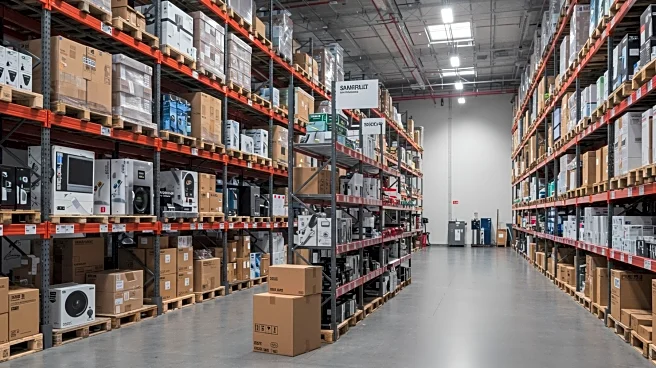What is the story about?
What's Happening?
Walmart, the world's largest retailer, is experiencing rising costs due to President Trump's tariffs on imports. The company has managed to mitigate some of these costs but expects them to continue increasing throughout the year. As tariffs affect virtually all imports, retailers like Walmart, Home Depot, and Target are seeing the cost of goods rise, leading to price adjustments on certain items. Despite these challenges, Walmart has attracted higher-income shoppers seeking deals, while middle- and lower-income customers have adjusted their purchasing behavior. Overall, consumer spending remains strong, with Walmart's U.S. sales growing by 4.6% in the latest quarter.
Why It's Important?
The tariffs imposed by President Trump's administration have significant implications for the retail industry and consumer behavior. As costs rise, retailers are forced to adjust prices, which can impact consumer spending patterns. While Walmart has managed to attract higher-income shoppers, the tariffs pose challenges for middle- and lower-income consumers, who may need to alter their purchasing decisions. The broader economic uncertainty created by tariffs affects retailers' ability to plan and invest, potentially leading to shifts in inventory management and pricing strategies. These developments highlight the complex interplay between trade policy and consumer economics.
What's Next?
Retailers will continue to navigate the challenges posed by tariffs, balancing cost increases with consumer demand. As tariffs remain in place, companies may need to explore alternative sourcing strategies or adjust pricing models to maintain competitiveness. The ongoing economic uncertainty may prompt further shifts in consumer behavior, influencing retailers' inventory and sales strategies. Policymakers and industry leaders will likely engage in discussions about the long-term impact of tariffs on the retail sector and broader economic stability.
Beyond the Headlines
The tariffs raise questions about the sustainability of current trade policies and their impact on global supply chains. Retailers' ability to adapt to rising costs and changing consumer preferences will be crucial in maintaining market stability. The situation underscores the need for strategic planning and innovation in the face of economic challenges, as well as the importance of considering the broader implications of trade policy decisions.
















